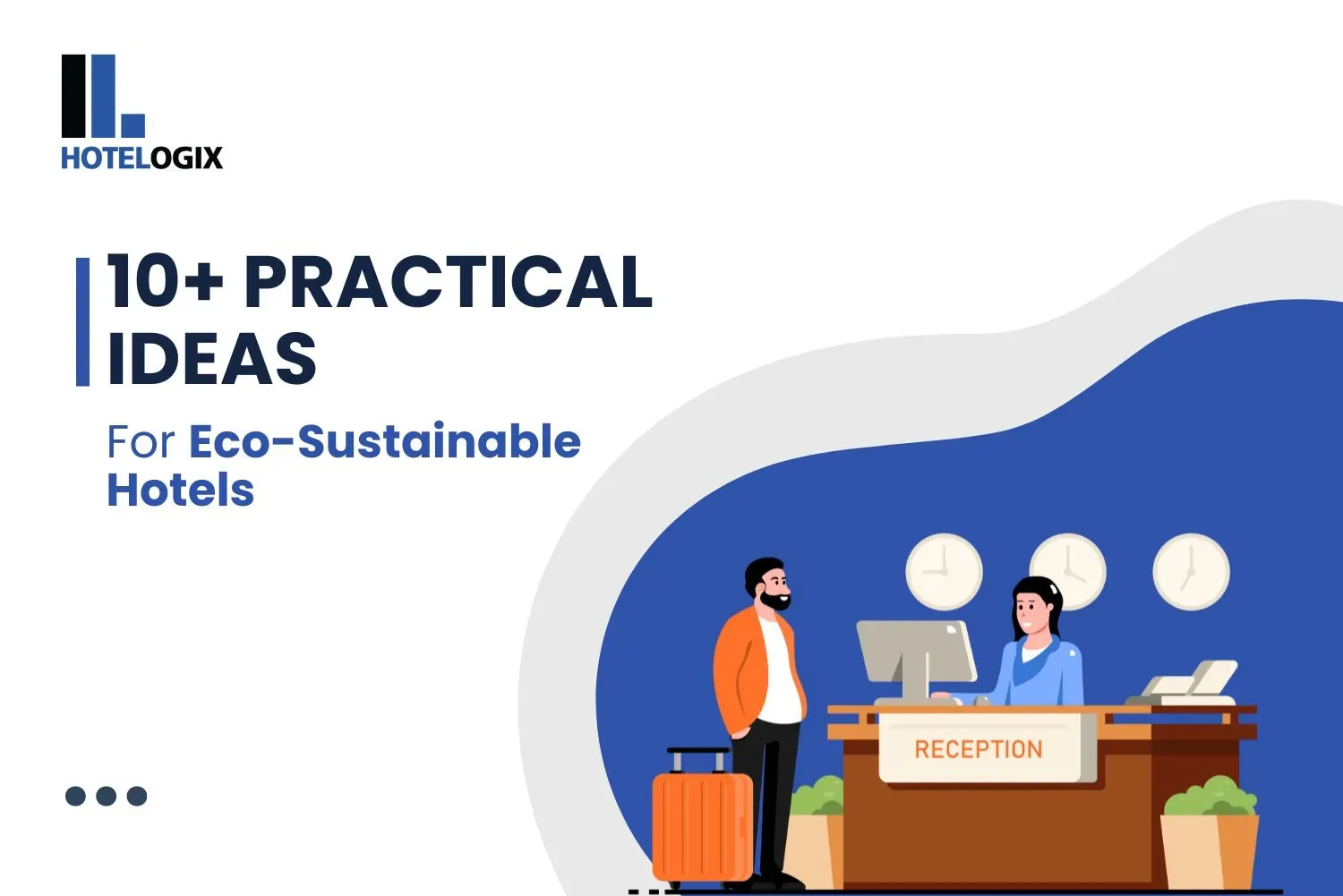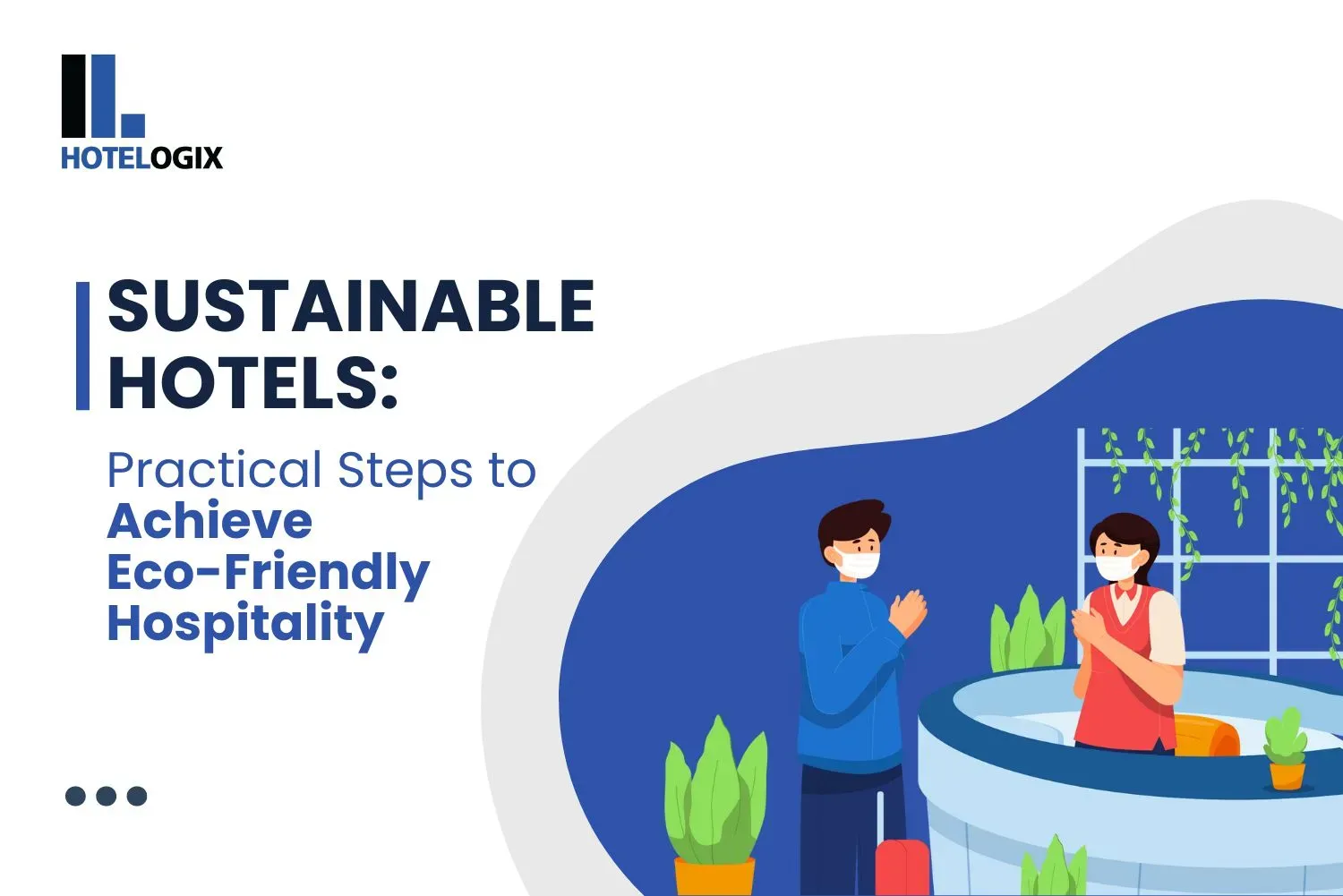"Did you know 78% of travelers now prefer eco-friendly accommodations, making sustainability a key factor in their decision-making?"
According to Booking.com, 2022 Sustainable Travel Report, 78% of global travelers intend to stay at least once in eco-friendly or green accommodations in the upcoming year. This reflects a growing trend among travelers who prioritize sustainability in their lodging choices
In today’s hospitality landscape, sustainability is no longer a luxury; it’s an expectation. Guests are becoming more conscious of their environmental footprint, and they want their travel experiences to align with their values. For hoteliers, managing resources like energy, water, and food efficiently might feel overwhelming—but the benefits of adopting sustainable practices go far beyond meeting guest demands.
This blog will guide you through practical, actionable steps to implement sustainability at your property, helping you reduce resource wastage, enhance guest satisfaction, and save costs.
What is Sustainability?
Sustainability is about balance. According to the United Nations, it means "meeting the needs of the present without compromising the ability of future generations to meet their own needs."
For hotels, this involves a conscious effort to use resources responsibly and minimize waste. From managing electricity consumption to addressing food wastage, the aim is to operate in a way that’s kind to the planet and beneficial to your business.
Why Hotel Sustainability Matters
Environmental Responsibility
Hotels consume significant amounts of energy and water daily, contributing to global resource depletion. Adopting sustainable practices can drastically reduce your property’s environmental footprint while setting an example for eco-conscious operations.
Guest Demand
Modern travelers aren’t just looking for a place to stay—they want experiences that align with their values. By integrating sustainability into your operations, you make your property more appealing to eco-conscious guests, giving them more reasons to choose your hotel over competitors.
Business Benefits
Sustainability isn’t just good for the planet—it’s great for business. Efficient resource management lowers operational costs, builds a strong brand reputation, and fosters guest loyalty. Furthermore, compliance with environmental regulations ensures long-term viability.
Key Areas to Control in Hotels
Electricity Usage
Electricity accounts for a significant portion of a hotel’s operational expenses. Implementing energy-efficient solutions can bring both environmental and financial benefits:
- Motion Sensors: Install sensors in hallways and restrooms to turn off lights automatically when unoccupied.
- Keycard Systems: Use systems that switch off power in guest rooms when they’re vacant, preventing unnecessary energy consumption.
- LED Lighting: Replace traditional lighting with energy-efficient LED bulbs, reducing electricity usage while extending bulb life.
- Smart Thermostats: Program thermostats to adjust room temperatures based on occupancy and weather conditions for optimal energy use.
Water Conservation
Water scarcity is a pressing global issue, and hotels are significant consumers of this resource:
- Low-Flow Fixtures: Install water-saving faucets, showerheads, and toilets without compromising guest experience.
- Linen and Towel Reuse: Encourage guests to reuse towels and linens through clear, friendly signage.
- Rainwater Harvesting: Use harvested rainwater for irrigation and cleaning purposes.
- Leak Detection Systems: Monitor water usage in real-time to identify inefficiencies and fix leaks quickly.
Food Waste Management
Food waste not only impacts the environment but also affects your bottom line:
- Smart Inventory Systems: Track ingredient usage to avoid overstocking and reduce spoilage.
- Donation Programs: Partner with local food banks to donate surplus food.
- Composting: Convert kitchen waste into compost for landscaping or share it with local farmers.
- Portion Control: Offer flexible portion sizes to minimize leftovers while meeting guest needs.
Read Also - What is a Kitchen Order Ticket? Importance of KOT in Hotels
Consumables Management
Managing single-use items and other consumables sustainably can significantly reduce waste:
- Refillable Dispensers: Replace single-use toiletries with refillable options.
- Eco-Friendly Cleaning Products: Use biodegradable and non-toxic cleaning supplies that are safer for the environment and staff.
- Biodegradable Packaging: Partner with suppliers using eco-friendly packaging for guest amenities.
- Inventory Monitoring: Track consumables to prevent over-ordering and reduce waste.
10+ Practical Ideas for Eco-Sustainable Hotels

1. Automated Room Technology
Integrate IoT devices to optimize energy consumption by controlling lighting, temperature, and blinds based on room occupancy. This not only reduces energy waste but also enhances guest comfort by providing a modern, tech-savvy experience.
2. Plastic-Free Amenities
Eliminate single-use plastic by replacing plastic water bottles with glass alternatives or filtered water stations. Complement this with sustainable options like bamboo toothbrushes, compostable toiletries, and reusable straws to reinforce an eco-friendly image.
3. Composting Systems
Establish compost bins in kitchens and dining areas to convert food waste into nutrient-rich compost for landscaping. This practice reduces landfill contributions while promoting a circular economy by utilizing waste effectively.
4. Eco-Certifications
Work toward certifications like Green Key or Earth Check to demonstrate your commitment to sustainability. These certifications not only validate your efforts but also attract eco-conscious travelers who value staying at certified green accommodations.
5. Rainwater Harvesting
Install rainwater collection systems to irrigate gardens and use for non-potable purposes like cleaning. This reduces dependence on municipal water supplies and supports water conservation efforts, especially in regions prone to scarcity.
6. Local Partnerships
Collaborate with local farmers, artisans, and eco-tourism operators to promote sustainable practices. By sourcing ingredients and amenities locally, you reduce transportation emissions and provide guests with authentic, regional experiences.
7. Green Roofs and Architecture
Invest in eco-friendly building designs, including green roofs, energy-efficient windows, and improved insulation. These features lower energy consumption by maintaining indoor temperatures naturally and reduce the building’s overall environmental impact.
8. Carbon Offsetting
Work with organizations offering carbon offset programs to neutralize your hotel’s carbon footprint. Encourage guests to contribute by providing options to offset the emissions from their stay, fostering a shared commitment to sustainability.
9. Digital Detox Packages
Create packages that focus on reducing energy usage and reconnecting with nature. Offer activities like hiking, yoga retreats, or outdoor stargazing to encourage guests to disconnect from digital devices and enjoy a low-impact stay.
10. Sustainable Boutique Hotel Packages
Design exclusive packages that highlight local culture, eco-friendly activities, and organic dining experiences. These packages cater to travelers seeking personalized, sustainable travel options while supporting your hotel’s green initiatives.
Read Also - Starting a New Hotel: From Groundwork to Guestbook
Challenges and Solutions for Sustainable Hotels
Transitioning to sustainability is rewarding but comes with its challenges. Below are key obstacles hotels face and simple solutions to overcome them.
1. Cost of Implementation
Challenge: Going green can feel expensive. Installing energy-efficient systems or sourcing eco-friendly materials often requires upfront investment, which can be tough for small hotels.
Solution:
- Start Small: Begin with simple changes, like switching to LED lights, using low-flow showerheads, or starting towel reuse programs. These steps save money over time.
- Look for Support: Many governments offer grants and tax breaks for green initiatives, like installing solar panels or upgrading insulation.
- Think Long-Term: Show how savings add up over time. For example, energy-efficient appliances may cost more upfront but can lower electricity bills significantly.
2. Staff Training
Challenge: Staff may not know why or how to follow sustainable practices, leading to missed opportunities to save resources.
Solution:
- Train Regularly: Hold workshops to teach simple eco-friendly habits, like recycling or conserving energy in daily tasks.
- Motivate with Rewards: Recognize staff who follow green practices with small bonuses or perks.
- Lead by Example: Managers should show commitment by practicing sustainability themselves, and inspiring others to follow.
3. Guest Awareness
Challenge: Some guests may not understand or support eco-friendly changes, like skipping daily towel changes or reducing single-use plastics. They might see these as cost-cutting, not eco-conscious.
Solution:
- Share the Story: Use pre-arrival emails or signs in the lobby to explain your green programs. Show how guests help save water and energy by participating.
- Offer Perks: Give discounts or freebies to guests who choose eco-friendly options, like skipping housekeeping services for multiple days.
- Show Impact: Share simple facts, like how many liters of water were saved with their help. Transparency makes a big difference.
4. Technology Investment
Challenge: Tech solutions, like energy monitoring systems, can seem expensive and complicated to implement.
Solution:
- Use Scalable Tools: Choose affordable options like Hotelogix, a cloud-based platform that helps track energy use, water consumption, and inventory without high costs.
- Start Where It Counts: Focus on areas like lighting or heating first, as they use the most energy. Smart thermostats or motion sensors can make a big difference.
- Adopt Gradually: Upgrade systems step by step, prioritizing areas that save the most money and resources.
5. Balancing Sustainability with Guest Expectations
Challenge: Some guests may think that sustainable practices reduce comfort or quality. For example, refillable soap dispensers might seem less appealing than single-use toiletries, or using less water for laundry could feel like a compromise on cleanliness.
Solution:
- Explain Clearly: Use signs or emails to show guests how eco-friendly choices, like refillable dispensers, help the planet while still being safe and high quality.
- Offer High-Quality Options: Use premium eco-friendly products like organic toiletries or bamboo straws. This shows guests that sustainability doesn’t mean lower standards.
- Blend Changes Naturally: Make eco-friendly upgrades feel seamless. For instance, smart room technology can save energy by turning off lights when rooms are empty, without guests even noticing.
By tackling these challenges with practical solutions, hotels can align their operations with sustainability goals, meet guest expectations, and reduce operational costs. A step-by-step approach ensures a smoother transition, empowering hoteliers to stay competitive in an increasingly eco-conscious market.
How Hotelogix Supports Sustainable Hotel Management
- Smart Resource Management: Monitor energy, water, and waste usage through integrated analytics.
- Digital Check-Ins and Billing: Minimize paper use with e-invoices and automated communications.
- Inventory Tracking: Keep tabs on stock levels to prevent over-ordering and wastage.
- Enhanced Communication Tools: Educate guests on sustainability efforts through pre-arrival messages and in-stay notifications.
Example: A boutique hotel in the Maldives reduced its energy consumption by 20% within six months using Hotelogix’s resource monitoring tools.
Conclusion
Sustainability is no longer optional—it’s essential for hotels striving to stay competitive and environmentally responsible. By addressing key areas like electricity, water, food, and consumables, you can create a property that guests love and the planet appreciates. Leveraging tools like Hotelogix’s PMS makes the process easier, efficient, and impactful.
CTA: Ready to make your hotel sustainable? Contact Hotelogix for a free demo today and take the first step toward a greener future!

